GUJORNAL
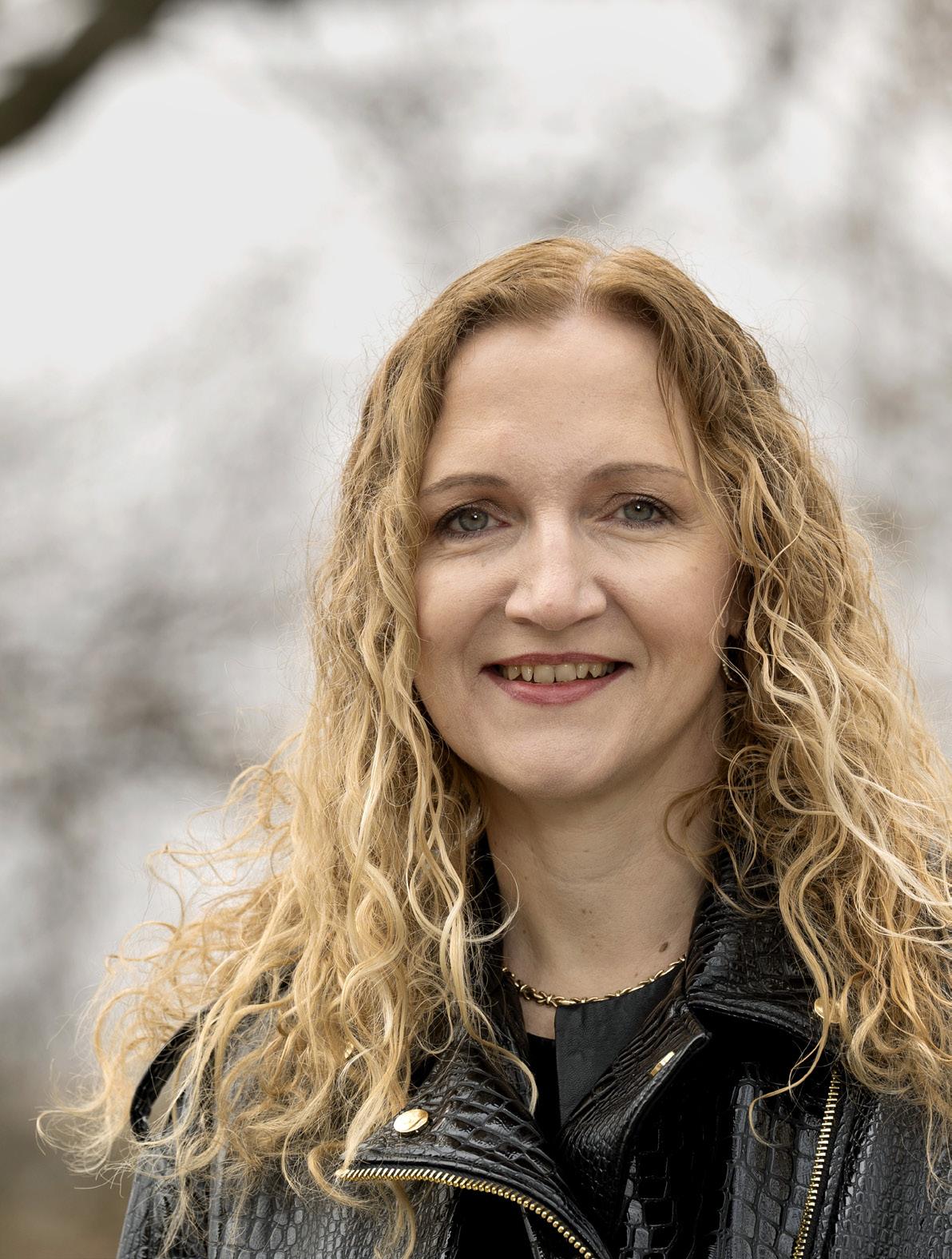
NEWS
Kick-off for unique Alzheimer study
NEWS
Why is Africa so poor?
REPORT
Europe and the war in Ukraine
Eating with the brain
Suzanne Dickson studies hunger hormones
INDEPENDENT STAFF MAGAZINE AT THE UNIVERSITY OF GOTHENBURG #2 MAY 2024
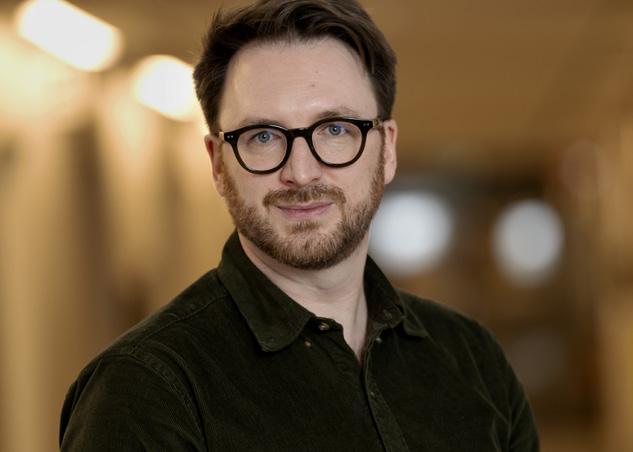
Contents
GU JOURNAL
The GU Journal has a free and independent position, is made according to journalistic principles.
Editor-in-chief: Allan Eriksson, temporarily on leave. Editor: Eva Lundgren
Phone: 031–786 10 81, e-mail: eva.lundgren@ gu.se
Photographer: Johan Wingborg, Phone: 070–595 38 01, e-mail: johan.wingborg@gu.se
Layout: Anders Eurén, Phone: 031–786 43 81, e-mail: anders.euren@gu.se
Address: GU Journal, University of Gothenburg, Box 100, 405 30 Gothenburg , Sweden. E-mail: gu-journalen@gu.se Internet: gu-journalen.gu.se ISSN: 1402-9626
News 04–05
04 Alzheimer study needs 3 000 participants.
Profile 06–09
06 Studying hunger hormones.
Report 10–19
New cancer therapy. 11 Saved by a new treatment. 12 The problematic African history.
14 Europe in the shadow of the war.
16 A profound change for Europe.
17 Europe has to take more responsibility.
18 History is still important.
19 Disrupted world order.
People 20–21
20 Stephan Zunes hopes education will bring better decisions.
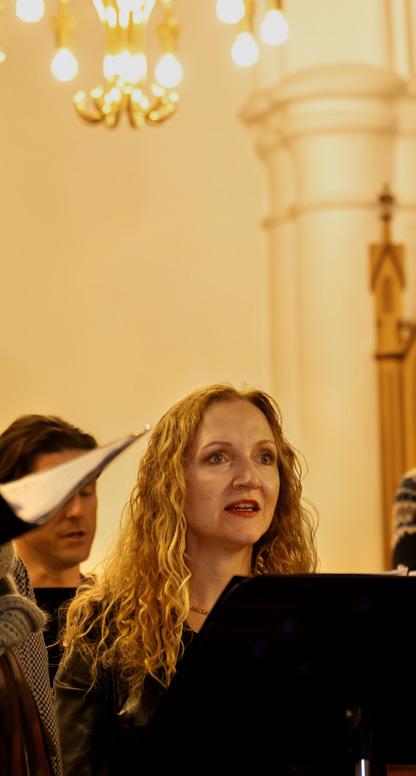
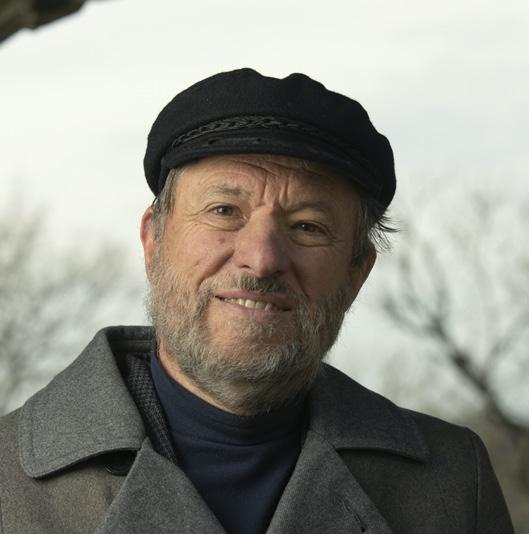
2 GUJOURNAL MAY 2024
04 20 Hopes that education will lead to a better world. Starting
Alzheimer study.
an
06 Suzanne Dickson studies why we get hungry.
10
Spring and the new Staff Portal is here!
pring has finally arrived and so has our new Staff Portal, which launched on the 8th of April. It has taken a long time to finalize the new digital workspace. Our aim has been to make it more adaptable to individual needs and to present the information and tools each member of staff uses most frequently in their own work. We also hope that it will help tie GU together as a shared employer by promoting a more consistent information output. It is surely a big change for all of us, but I am certain it will be a great improvement. Our work with this will continue to be evaluated and adjusted as we move ahead.
In March, the university management had a dialogue with the Ministry of Education. Meanwhile, operational dialogues have been going on with our faculties. Both forums are about following up on the past year, highlighting the joys and challenges, but also looking a little bit ahead. The ministry clearly declared that our sector cannot count on any new funds or expansions. Instead, priorities are expected to fall within and between higher education institutions in order to reach the government’s goal of more people educated in the STEM-fields (Science, Technology, Engineering and Mathematics). The minister of education recently wrote a debate article on the subject, which initiated a lively exchange of opinions. Voices from GU, among
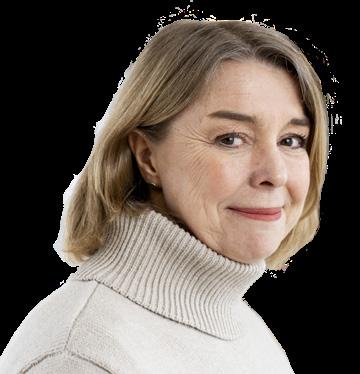
others, emphasize the importance of protecting the broad and flexible means of higher education available in Sweden, with a large proportion of independent courses in a wide range of subject areas. Last week, the other Swedish vice-chancellors and I went on a trip to the Netherlands, where we discussed current issues. One of these was precisely the importance of offering shorter courses with the university’s quality seal attached to them, something we in Sweden have a long tradition of in form of stand-alone courses. Other issues on the agenda were governance and financing higher education, merit and promotion systems, security, and responsible internationalization. Universities in the Netherlands are even more international than here, which presents its own set of challenges from both security threats and nationalist forces that limit the possibility of teaching in English. We have a lot to learn when it comes to assessing risks and opportunities in international collaborations so achieve the right balance between minimizing risks without closing ourselves off more than necessary.
In this issue of the GU Journal, you can read about dismissals of staff at the Preschool Teacher Education. This unhappy situation has affected GU and other universities and is the result of a declining enrollment in the program. This is all very tough and unusual for everyone involved and we are trying to handle it as best we can.
To finish on a happier note, I can reveal that intense preparations are underway for a really important visit to GU from Finland. The topic will be foreign and security politics.
 Vice-Chancellor MALIN BROBERG
Vice-Chancellor MALIN BROBERG
Europe in the shadow of war
n this issue, we publish several articles on Europe in the shadow of the war in Ukraine. How can the EU be a stronger pillar within NATO, and how should we respond to an increasingly aggressive Russia? Can a war perhaps strengthen, rather than weaken, the idea that the world needs shared and well-respected rules? And can today’s politics be explained by looking back at history? How is, for example, modern day Hungary affected by the Treaty of Trianon in 1920, when the country lost 70 percent of its historical territory?
In this issue we also have an interview with Suzanne Dickson, whose special interest is the human brain. This complex organ can sometimes be strongly affected by just one substance, such as L-dopa that helps patients with Parkinson’s disease.
We also present an interview with Stephen Zunes who hopes that education can make people more engaged in society, and we also have an article where Mo Ibrahim examines why Africa is so poor.
Hope you find this issue interesting!
Eva Lundgren Masthead
GUJOURNAL MAY 2024 3
Vice-Chancellor
Unique study on Alzheimer
In the future, it will be possible to identify early signs of Alzheimer’s disease using a mobile phone app and a blood test at your local health clinic. At least, this is a scenario that the pioneering REAL AD trial will be investigating, starting on April 22.
– We will be needing at least 3,000 participants in the trial, preferably many more than that. So if you have not been diagnosed with dementia, is from 50–80 years old and are able to get to one of VGR Närhälsan’s health clinics, participate in the trial!
Encourages
Michael Schöll, Professor of Molecular Medicine.
FOLLOWING ONE SETBACK after another, research into Alzheimer’s disease has developed at a record pace over the past few years One example of this is the lab around Kaj Blennow and Henrik Zetterberg, both1 Professors of neurochemistry, and who recently developed a blood test that can be taken at your
local health clinic in order to discover early indications of Alzheimer’s disease. Another example is the antibody lekanemab, developed by Uppsala researcher Lars Lannfelt, which has been given a green light as a disease-modifying treatment by the American pharmaceutical authority FDA, and where a European approval is pending.
– THE FACT THAT we can use a blood test to discover early signs of Alzheimer’s disease, and that we have drugs that counteract aspects of the disease, will entail major challenges to healthcare, Michael Schöll explains. Today, most Alzheimer patients are only diagnosed at a relatively late stage, when the new drugs are only of limited use. And the diagnosis is often done by primary healthcare providers, who might not have access to disease-specific biomarkers for a definite diagnosis. To be able to make a more informed assessment earlier using a simple blood test will of course mean an enormous improvement.
The blood test will make it possible for the physician
to divide patients into three groups: those with clear signs of Alzheimer’s disease, those who lack any such signs, and those who are in a grey area and need further investigation.
THE REAL AD TRIAL is based on participants conducting cognitive tests at home using an app or a computer.
– The tests are then analysed by the research team. After three months, the participant will have a blood test taken at a health clinic in the Västra Götaland region. If you continue to participate in the study, another blood test is taken after 18 months and subsequent tests at home in month 27 and 36 of the trial.
Since this is a research study of new, experimental methods, participants will not be given any diagnostic test results.
– But we will of course want to give them something for their participation. So we will try to create a community for the participants by keeping them informed about the trial and sharing other relevant research with them.
REAL AD has several aims.
It is partly about investigating whether simple blood tests and cognitive tests in the home are good ways of detecting early signs of Alzheimer’s disease, and partly about studying how the healthcare system can adapt to the major changes that new drugs and diagnostic methods will entail.
– BUT IT IS ALSO about studying the prevalence of deviating biomarkers and cognitive levels in a wider population.
REAL AD will now initiate a major information campaign, says Michael Schöll.
– The trial will require at least 3,000 participants, but has the capacity to manage 10,000. So we will appear in several media channels and present information at all health clinics within Närhälsan. We have also informed various politicians about what will happen; REAL AD coffee mugs have already been seen in Parliament.
Text: Eva Lundgren
Photo: Johan Wingborg
4 GUJOURNAL MAY 2024 News
www.realad.se/.
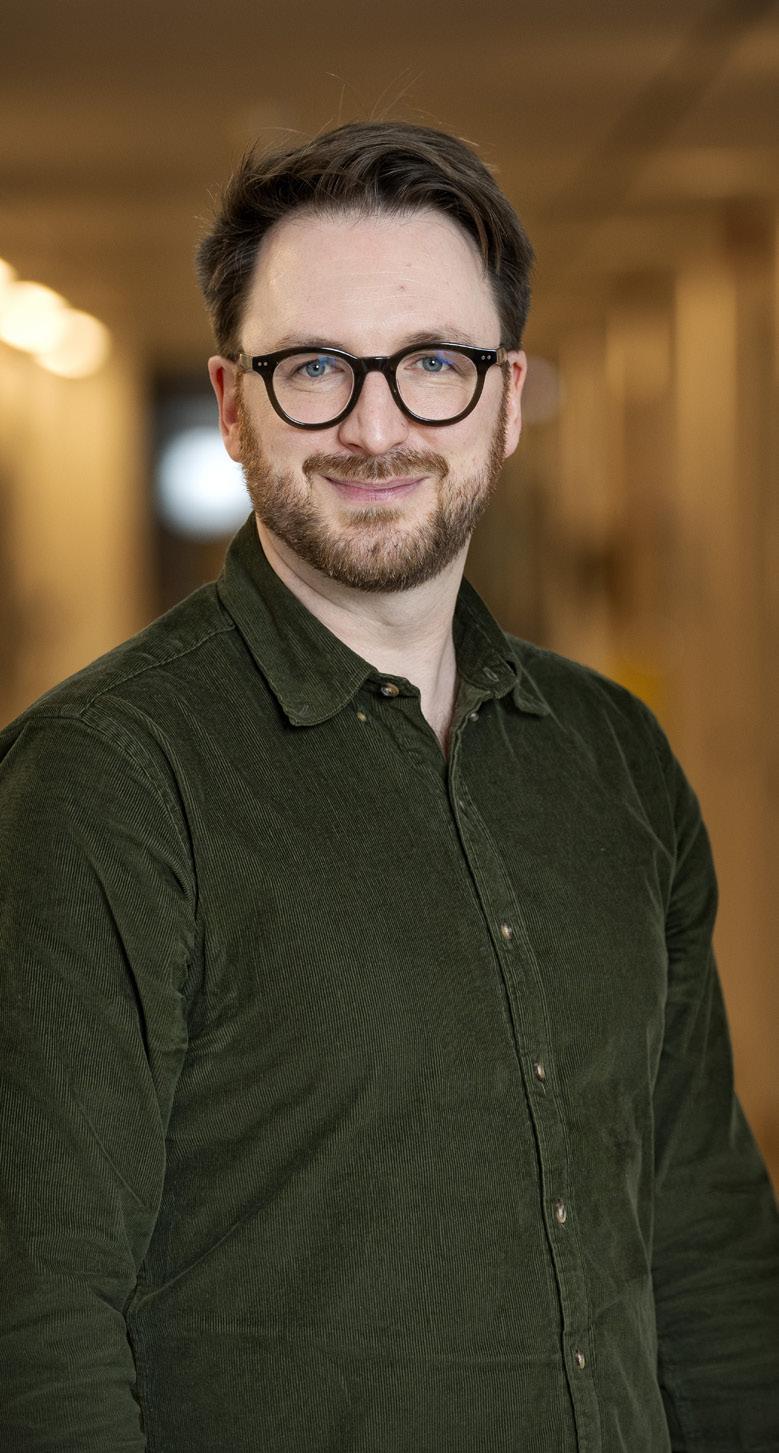
»To be able to make a more informed assessment earlier using a simple blood test will of course mean an enormous improvement.«
Michael Schöll
→ About the trial: On April 22 the trial Validering av en realistisk screeningmetod för tidig Alzheimers sjukdom (REAL AD) will begin. The trial investigates the possibility of using digital methods and blood test to identify early stages of Alzheimer’s disease.
Participants must be from 50–80 years old and not been diagnosed with dementia. They must have access to a mobile phone, tablet or computer, have a Bank ID and be able to go to one of Närhälsan’s 111 health clinics in the Västra Götaland region.
A randomised cohort of around 440 people will be invited for an additional clinical investigation to verify the diagnostic value of the new methods.
The trial is supported by the Swedish Research Council, ALF, Alzheimerfonden, VGR R&D funds and 1.1 million euro from European Innovative Health Initiative as well as several grants from the industry. Find out more: https://www.realad.se/.
GUJOURNAL MAY 2024 5
Michael Schöll hopes that the study will interest many participants.
Why do we want to eat?

Ghrelin is a hormone that increases when we are hungry and that makes us want to eat. As we sate ourselves, ghrelin levels fall, which should make us stop eating. Still, the world’s obesity epidemic keeps growing. And, at the other end of the body weight spectrum, the number of patients with anorexia nervosa is also on the increase. Why is that?
These are questions into which Suzanne Dickson, Professor of Physiology, is conducting research. →
6 GUJOURNAL MAY 2024 Profile
Text: Eva Lundgren | Photo: Johan Wingborg
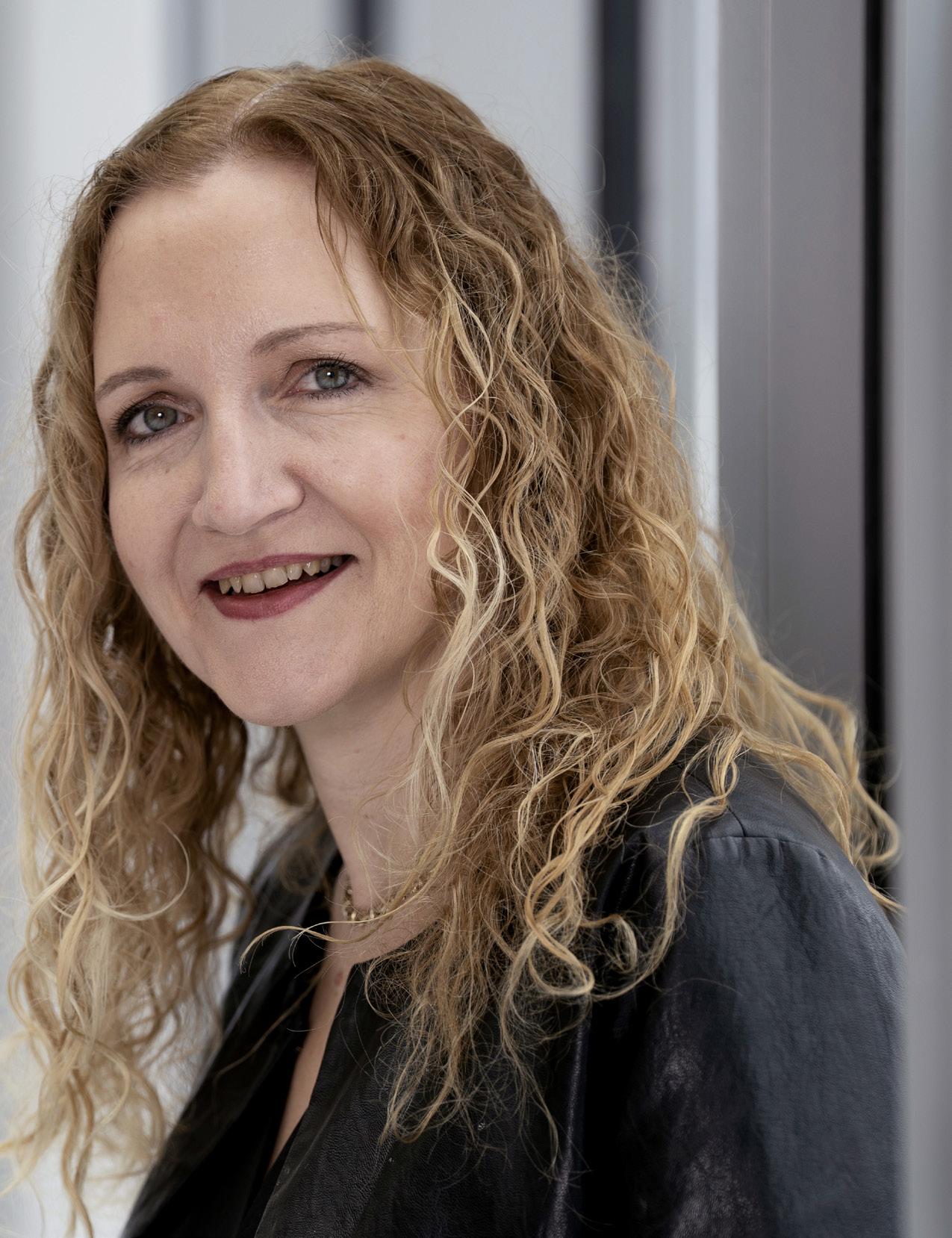
GUJOURNAL MAY 2024 7
s a young pharmacology student in the mid-eighties in Edinburgh, Suzanne Dickson became fascinated by the brain and how it functions.
– On the one hand, the brain seems incredibly complex but on the other, only as few as a hundred nerve cells can control vital functions and behaviours. Disease symptoms that are severe and varied can sometimes be alleviated by adding one single substance, such as L-dopa for Parkinson’s patients, which was one of Arvid Carlsson’s important discoveries.
It was when she was a doctoral student in Cambridge doing research with Professor Gareth Leng that Suzanne Dickson showed that ghrelin-related drugs act in the brain, a discovery that would eventually lead to the realisation that ghrelin is important to our ability to feel hunger, motivating us to eat.
That research forms the foundation of the field that Suzanne Dickson is still spending her time on: how external and internal signals affect our appetite and eating behaviours.
– Today, we know, for example, that ghrelin, a hunger hormone produced by the stomach, affects similar groups of cells as the anti-obesity hormone leptin, which is produced in the adipose tissue, including pathways controlling energy balance.
– Ghrelin also targets the dopamine cells in the reward system that are help us seek out and over-consume palatable foods. The expectation of eating things we enjoy and, in particular novel interesting foods, makes the dopamine cells extra active. For me, that could be the first “semla” of the year!
Intestinal hormones, such as ghrelin, play a part in our appetite and food choice, and their levels are affected by the amount and composition of the food we eat, Suzanne Dickson tells us.
– But our hormones are also governed by the external environment, such as the lovely scent of the “semla” and its yummy appearance. All such external and internal signals converge in the brain’s orexigenic system which regulates appetite. What my research team is interested in is to use entirely new techniques to map the neural pathways underpinning the system.
The complex mechanisms that regulate our appetite have evolved over millions of years to cope with periods of starvation and food scarcity. In our modern age, these same systems are operating, now in an obesogenic environment, with palatable foods available 24/7.
Obesity is a growing problem in large parts of the world.
– One recent major breakthrough is ozempic, a drug that is used to treat type-2 diabetes and which reduces the appetite and helps the body to lower the blood glucose levels when they are too high. Lately, the drug has turned out to be effective against obesity as well. But for severely obese people, the interventions must involve other things than a sole focus on weight; pathological obesity is also linked to mental health, where one of the consequences is excessive intake of food.
And anorexia nervosa is also on the rise but, as yet, we lack drugs to treat it, Suzanne Dickson explains.
– We have a very poor understanding of the neurobiology underlying this disease. It is a deadly disease and under-researched. We do not understand, for example, why anorexia nervosa patients do not eat despite having high ghrelin levels that should make them eat. One interesting therapy concerns treating them with leptin, which might sound crazy because this hormone reduces food intake. These patients have so little adipose tissue they have very little leptin in their blood. Restoring the leptin to more normal levels may improve mental health in these patients, whose thoughts otherwise only revolve around diet, calories and extreme exercise. Unfortunately, this type of research is very expensive and the problem, as always, is funding.
Last year, in order to contribute to the effort to gather financiers, researchers, politicians and authorities, Suzanne Dickson became the President of the NGO, European Brain Council (EBC). The organisation’s aim is to increase investments in research in order to accelerate research and innovation and hence, improve the lives of the around 179 million Europeans who live with a brain disease.
– Among other things, we work on increasing public awareness of animal testing, a sensitive area around which a lot of disinformation is being spread. For example, there is a notion that there already exist alternative methods that may replace research on animals, which is simply not true; at best these methods can provide some complementary knowledge. Animal testing is strictly regulated in both Swedish and European law and subjecting animals to unnecessary suffering is a criminal offence.
Suzanne Dickson is also a member and manager of the European College for Neuropsychopharmacology (ECNP) as well as a member of ECNP’s Workshop for Early Career Scientists in Europe.
8 GUJOURNAL MAY 2024 Profile
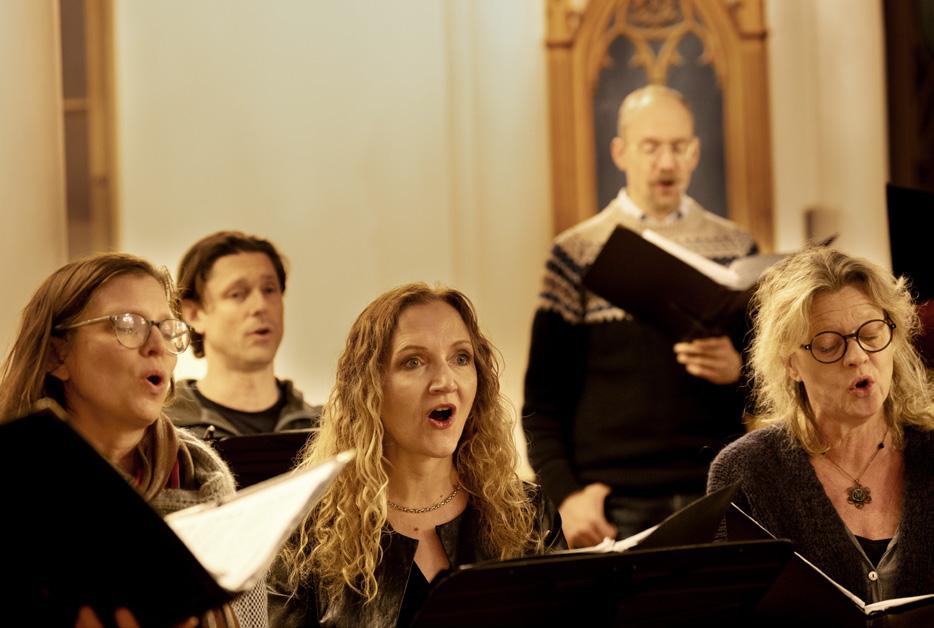
– Up until their doctoral degree, universities are normally quite good at supporting their young researchers but after that, there is no obvious path forward. This is why it is important that those of us who after all managed to get ahead in the world of research provide support to those who come after us.
Lately, research into brain disease has taken huge leaps forward. The Swedish drug lecanemab, which slows down the development of Alzheimer’s disease, has recently been approved in the U.S.
– Psilocybin, an active substance in psychedelic mushrooms, is another promising field and seems to have a positive effect on depression. There is also research into connecting the human brain to computers. New breakthroughs in brain research happen constantly so there is every reason to be hopeful.
During her time in Cambridge Suzanne Dickson met a visiting professor from the University of Gothenburg, John-Olov Jansson, whom she later married. She has now lived in Sweden for 20 years.
– I feel Swedish and appreciate the Swedish quality of life. For example, I find it great that we often cook food ourselves, instead of buying ready meals, which is common in Britain. But what I do miss is speaking my English native language.
Being a researcher in Sweden has its pros and cons compared to Britain.
– For example, in Cambridge you receive financial support for things that you pay for here in Sweden, such as rent and co-financing of doctoral students, things that are associated with being an active researcher. But other things are better in Sweden, such as
research facilities. In Cambridge, my office was housed in a listed building that you could not alter in any way, which made it hard to build labs and other forms of infrastructure.
One of Suzanne Dickson’s major interests is singing. For many years, she has been a member of the Haga Motet Choir which specialises in baroque music.
– I love Bach but there is of course other wonderful music as well, such as Pergolesi’s Stabat Mater. We have an amazing choirmaster and since all choir members can read music, we can quickly learn a new repertoire. Every minute with the choir is pure enjoyment.
SUZANNE DICKSON
Works as: Professor of Physiology with a special focus on neuroendocrinology.
Family: Husband John-Olov Jansson, Professor of Physiology at Sahlgrenska Academy, a 20-year-old son and an 18-year-old daughter.
Most recently read book: The Matter of facts by Gareth Leng and Rhodri Ivor Leng.
Other hobbies: Singing with the Haga Motet Choir.
GUJOURNAL MAY 2024 9
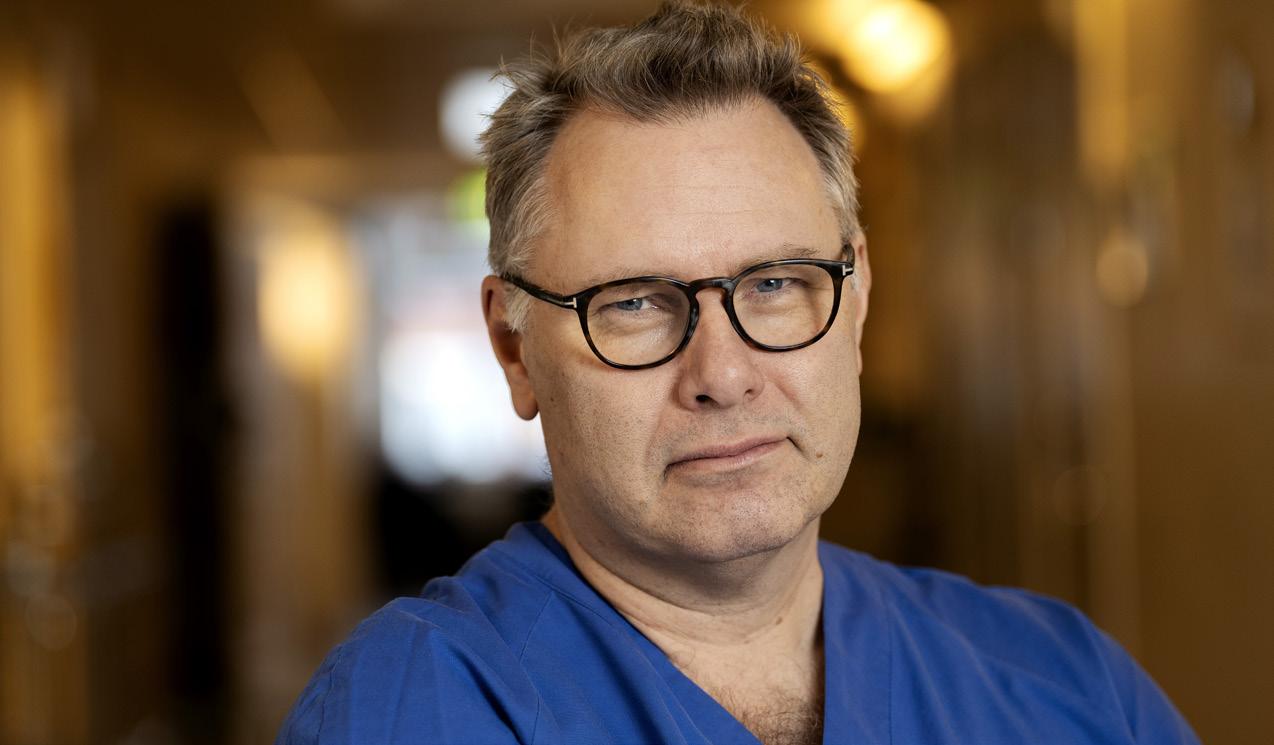
New hope with immunotherapy
Immunotherapy is a new form of treatment that has revolutionised healthcare, according to Lars Ny, Consultant and Professor of immuno-oncology.
– Currently, we are at a stage where try to optimise the treatment by combining immunotherapy with other drugs, including chemotherapy, as well as radiotherapy and surgery. It is developing at a very rapid pace.
Immunterapi handlar oImmunotherapy is about using the body’s own defences to attack cancer cells. In routine healthcare the method has been available for over ten years, and Lars Ny is one of the pioneers in the field.
– My main focus is on malignant melanoma originating from skin and eyes. But the method is also used for other types of skin cancer as well as cancer of the lungs, bladder, head and neck, as well as certain types of intestinal cancer. Previously, we have been very cautious when it comes to asserting that the treatment really cures cancer But today we can say that more than half of patients with metastatic melanoma gain several years of life and more and more patients are entirely cured.
In the 1990s, James P. Allison and
Tasuku Honjo discovered a type of brake system on the surface of the white blood cells called T-cells which form part of the body’s immune system. The brake systems can be turned off with special antibodies, which activates the T-cells enabling them to attack the cancer.
– Earlier, we tried instead to stimulate the T-cells, which risked leading to hyperactivity. Now, we remove the brake using
so-called immune checkpoint inhibitors. The first inhibitors to be approved by the Medical Products Agency are called CTLA-4 and PD-1 inhibitors and are administered intravenously. But the efficacy of immunotherapy varies depending on the type of tumour. If there are many T-cells near the tumour, more cells can be activated in defence than if the number of T-cells is lower.
Other types of cell therapy have also
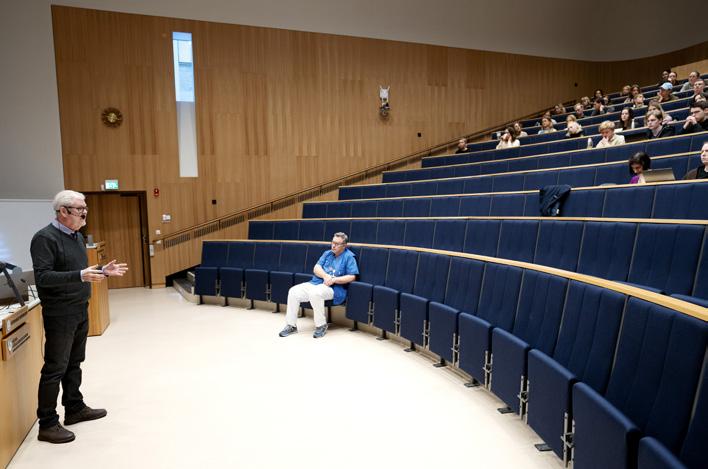
10 GUJOURNAL MAY 2024
Report NEW TREATMENT
Kent Persson gives a lecture to medical students.
now been approved in Sweden, such CAR T-cell therapy.
– This involves retrieving T-cells from the patient, modifying them genetically and making them more efficacious in combating the cancer, and reintroducing them into the patient.
At the beginning of the year, Lars Ny and his team received no less than 10 million krona from the Cancer Fund for a new clinical trial for treatment of metastases in the liver in patients with ocular melanoma. It involves cultivating around one million T-cells from the liver tumour, so-called tumour-infiltrating lymphocytes (TIL), and then have a bioreactor produce additional cells until you have around one billion. Then the large quantity of T-cells are injected directly into the tumour tissue. This is called TIL therapy.
– We work across several disciplines together with radiologists, surgeons, tumour biologists and immunologists, and the first trial is conducted on six patients.
Immunotherapy, including cell therapy, has several benefits compared to chemotherapy, Lars Ny explains.
– The side effects of immune checkpoint inhibitors and TIL therapy are normally mild and most people can live normally during and after treatment. So for patients, immunotherapy is definitely a step forward. One drawback, specifically for TIL therapy, is the very high cost. On the other hand, TIL therapy is more efficacious and only needs to be administered once, so in the long term it might not cost very much after all. I am hoping that different forms of cell therapy in the future will constitute an important part of all cancer treatment.
Text:
About cell therapy
In 2012 the first immune checkpoint inhibitor for CTLA-4 was approved for use in routine healthcare in Sweden.
In 2015 the first PD1 inhibitors were approved in Sweden.
In 2018 cell therapy treatment with CAR T-cells was approved for leukaemia and lymphoma in the EU. Trials are ongoing for a large number of other forms of cancer. In 2022 immunotherapy is used with immune checkpoint inhibitors for skin cancer as well as cancer of the lungs, kidneys, bladder, oesophagus, stomach, large intestine and rectum, as well as lymph nodes and certain forms of breast cancer.
Saved by a new treatment
He had just retired and started planning future activities with his wife when he discovered a lump on his back.
– My wife thought I should have it checked out so I booked an appointment at the local health clinic. That was the start of completely different adventure than the one I had in mind.
This is the beginning of Kent Persson’s introductory lecture to the medical students in semester eight.
It was November 2012 when Kent Persson discovered what he thought was a fat globule on his back.
– I went to the health clinic and quickly got an appointment to surgically remove it. A sample was sent for analysis but I didn’t think much about it. A month had passed when I received a phone call: I had malignant melanoma.
Kent Persson was quickly admitted at Sahlgrenska Hospital to make sure the whole tumour was removed.
Then another three months passed. One day, Kent Persson discovered a swelling in his armpit and, some time later, a string of lumps on his back.
– In May 2013, back at the hospital, the doctor explained that I could have a surgery in August. Will I even be alive by then? was my question.
He had also developed un unpleasant cough. A chest X-ray and a CT-scan showed that the cancer had spread to additional nymph nodes, the lungs and the liver.
That was when Kent Persson met with consultant Lars Ny who instead of a death sentence had a suggestion.
– He told me about a large international clinical trial comprising 410 cancer patients. One half would be given traditional cytostatic while the other half would be given an entirely new treatment, called immunotherapy. Six patients would be participating in Gothenburg and Lars asked if I wanted to be one of them. What did I have to lose? I said yes immediately.
Treatment began on July 24. After
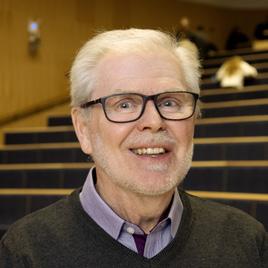
two weeks, when Kent Persson was lying on a hospital bed for IV treatment, he suddenly started shaking with cold.
– My nurse explained that it must be my immune system that started responding; so I was part of the group that received the new treatment!
The immunotherapy turned out to be surprisingly effective: the lumps started receding, the cough stopped, and Kent Persson´s zest for life returned. After another ten months treatment, all metastases were gone.
– The treatment continued for another year, followed by regular return visits. and then an additional year with regular return visits. Now I have been well for ten whole years.
One memorable moment in Kent Persson’s life took place in December 2018 when he met Nobel laureates James P Allison and Tasuku Honjo at Grand Hotel in Stockholm.
– It is their discoveries within immunotherapy that are the reason I am alive today. I had an opportunity to give my saviours a hug and all of us were overcome with tears.
Over the years, Kent Persson has talked about his treatment at seminars and in various forms of media. He has held lectures to the medical students at Sahlgrenska Academy for several years.
– Many people complain about the healthcare system, but I have had a marvellous experience. And clinical research is important, it saves lives and we should invest even more in it than we currently do!
GUJOURNAL MAY 2024 11
Eva Lundgren Photo: Johan Wingborg
Why are we so poor?
– Africa is ten times the size of India and three times the size of China. The continent has vast resources, both in terms of natural resources and of people. Then why are we so poor?
This question was posed by Sudanese-British businessman and philanthropist Mo Ibrahim in a KAP talk at the School of Business, Economics and Law on March 20.
Africa’s problems have several causes, Mo Ibrahim asserted.
– One cause is our dramatic history of slavery and colonialism. Various European powers have drawn lines across the map of Africa and created countries that have nothing to do with reality, neither ethnically nor historically. Some states, such as Chad, Niger and Burkina Faso, are entirely enclosed by other countries, through which you have to travel to reach the sea.
Africa’s infrastructure is also illogical.
– The roads were built from mines to ports in order to serve the needs of the colonisers, rather than to link the country together. And agriculture was used to grow tea and coffee, instead of supporting the native population. This
is the reason why the war in Ukraine is a disaster for Africa as well, since we have to import our food.
But Africa’s problems are also cause by Africans themselves, Mo Ibrahim argued.
– We have to take a look in the mirror and ask: What is wrong with us? Nigeria is one such example: previously the country was not only self-sufficient in terms of food, but could even export it. Then they found oil and people forgot to cultivate their land.
After a large number of African countries gained independence, the Organisation of African Unity was formed in 1963. At the time, they discussed how to handle the unnatural colonial borders.
– Instead of starting disputes the leaders took the wise decision to let the borders remain as they were. The world is not perfect, many countries have been subjected to severe injustice, but we must leave such things behind and look to the future.
From a Western perspective, democracy is about having free election every four years or so.
– But I would argue that democracy is a matter of good institutions, such as having a parliament and a judicial system, as well as free media. Such things barely existed when the African countries gained independence, the only strong institution
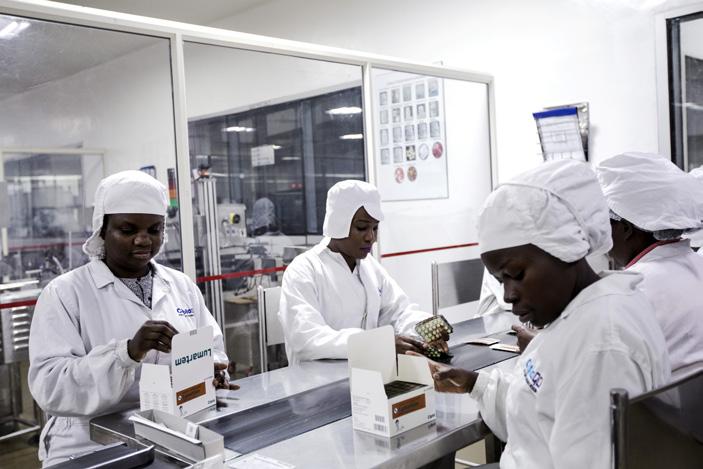
was the military. This is the reason why Africa in the 1960s and 1970s experienced as many as 87 military coups bringing a bunch of mad generals to power. Thus, Africa has wasted decades on misgovernment.
During the cold war, Africa became something of a chess board for the superpowers, Mo Ibrahim explains.
– Both side supported criminal leaders in order to gain access to Africa’s natural resources, UN votes, military bases and other assets. The justification for such operations disappeared in 1989, the very day the Berlin wall came down. Over the subsequent 20 years, the constitutions of African countries were developed, enabling multi-party systems and limited terms of office. It was a golden era for democracy and human rights on our continent.
»What kind of education are you getting when you only know of Africa’s worst leaders but not the best ones?«
MO IBRAHIM
Unfortunately, recent developments have again started to go in the wrong direction.
– Perhaps it is due to the pandemic, perhaps there are other reasons. But in Africa, like in many other places around the world, we have seen the emergence of strong men, leaders who amend the constitution and refuse to give up power. Because power is seductive.
In African countries, power is particularly tempting as there are no pensions or anything to go back to after you have stepped down, Mo Ibrahim explains.
– Has anyone in the audience heard of Mobutu? Idi Amin? I see several hands in the air. How about Festus Mogae? Pedro Pires? No? The two latter ones have received my foundation’s Ibrahim Prize, an African award for good leadership. What kind of education are you getting when you only know of Africa’s worst leaders but not the best ones? What if Hitler and Mussolini had been the only European leaders I had known about? It is true that corruption is rife in Africa and that it is
12 GUJOURNAL MAY 2024
En fabrik för tillverkning av malariamedicin i Uganda.
Photo: JOHAN
Report
WINGBORG
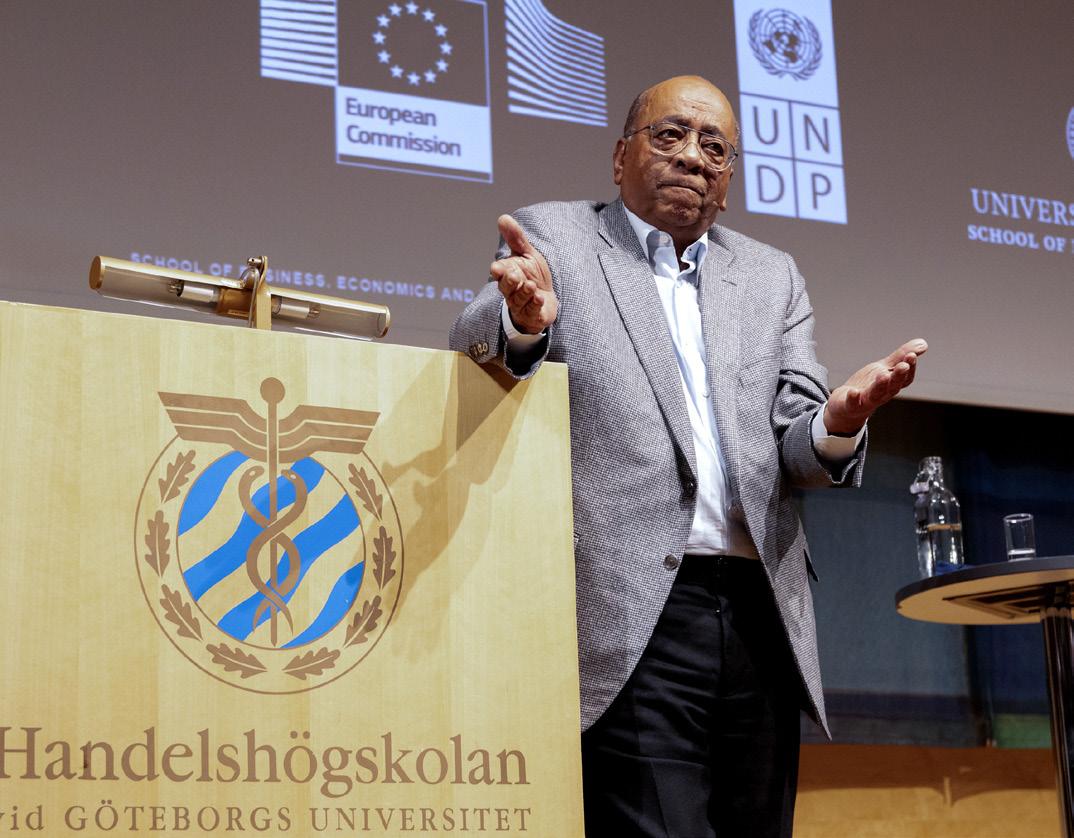
our responsibility to do something about it. But nobody is corrupt on their own, it always requires an additional party.
If African’s should take responsibility for their misgovernment, the West should assume responsibility for their participation in it, Mo Ibrahim argued.
– The annual illegal outflow of capital from Africa, because of Western corporations’ tax avoidance, corresponds to 88 billion dollars, money that should have been invested in healthcare and schools. The overall aid to Africa amounts to around 53 billion dollars – so who is financing who?
Africa is also more or less denied access to global institutions, Mo Ibrahim explained.
– The UN Security Council has five permanent members, but no country from Africa. But Great Britain and France are members. Why not Germany and Japan, both of which are larger in terms of both population and economy? The permanent members’ constant waving of red flags means that the council can never
achieve anything, either in Iraq, Syria or Ukraine.
And the World Bank, always with an American Chair, as well as the International Monetary Fund, whose Chair is always a European, need reforming, Mo Ibrahim argued.
– When I asked the Chair of the World Bank, Ajay Banga, about the purpose of the bank, he said that it is to reduce world poverty. And yet the bank spends 120 million dollars each year on letting its board live on bank premises. The board meets twice weekly, so when do they have time to work? Sri Lanka and Zambia have to wait several years on help – but if Greece or Ukraine need support, it happens swiftly. If all these global institutions lose their legitimacy, what is left? The answer: nothing.
Democracy is in decline in many places around the world, not only in Africa, Mo Ibrahim concluded.
– For example, the American congress is so polarised that it is unable to make decisions, and the Supreme Court has be-
come a political tool. So why should we in Africa try to emulate the West? When the democratic countries have stopped being examples to others, we are truly living in disquieting times.
About the lecture: The lecture, Challenges in African governance, leadership & democracy was held on March 19 in the Malmsten room, at the School of Business, Economics and Law. The lecturer was Sudanese-British businessman Mo Ibrahim who established the Mo Ibrahim Foundation that awards the Mo Ibraham Prize for deserving statesmanship in Africa. He is also the co-founder of the Africa Europe Foundation.
The lecture is part the Kapuscinski Development Lectures named after the Polish reporter Ryszard Kapuscinski and is organised by the European Commission, the UN developmental programme UNDP as well as partner universities and development think tanks.
GUJOURNAL MAY 2024 13
Text: Eva Lundgren Photo: Isac Lundmark
Mo Ibrahim föreläste på Handelshögskolan.
What happens

Report
Nato-övningen Nordic Response i mars 2024.
14 GUJOURNAL MAY 2024
Photo: Linus Sundahl-Djerf SVD / TT /
happens now?

Finland and Sweden have joined NATO and most EU member states are increasing arms spending. But how has Russia’s war in Ukraine otherwise affected Sweden and Europe?
The GU Journal asked two political scientists, an expert on international law and a historian of ideas.
→
GUJOURNAL MAY 2024 15
Text: Eva Lundgren Portraitphotos: Johan Wingborg
A profound change of European security
– For the first time ever, the Nordic countries now have a common basis for their defence policies, explains Lisbeth Aggestam, Associate Professor of Political Science.
Sveriges årliga bidrag till Sweden’s annual contribution to NATO will be less than many people may think, around 500–600 million krona, Lisbeth Aggestam explains.
– NATO does not have a large defence budget. Instead the partnership is based on each member state investing in its own defence, at least 2 percent of the country’s GDP. NATO is primarily about practice and planning together, such as conducting joint exercises, like Aurora last spring. This type of international cooperation suits Sweden well: the members do not give up their sovereignty and everybody formally has the same amount of influence, even though the alliance is of course very dependent on the U.S.
NATO’s strength is its credibility, Lisbeth Aggestam points out.
– When Germany’s Minister of Defence, Boris Pistorius, visited Sweden in the beginning of March he explained that NATO is prepared to defend every millimetre of its members’ territories. It was an important statement; the ability to deter enemies is the very prerequisite for the alliance’s success.
However, the dependency on the U.S. is a problem.
– The Americans have long argued that Europe should take more responsibility for their own security. For example, in 2012 President Barack Obama withdrew several American heavily armed units from Europe, which he then redeployed when Russia annexed Crimea in 2014. And it was Obama who introduced the rule that each member must invest no less than 2 percent of the country’s GDP in defence, something that is currently being done by only 11 member states. But when Donald Trump recently explained that NATO members that do not invest in their defence should be left in the lurch, it caused alarm. The statement risks undermining the core principle of NATO, that
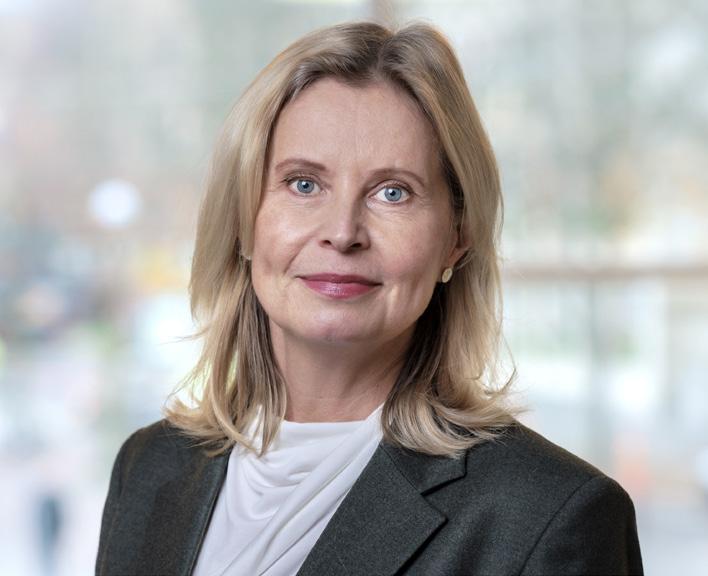
member states are there for one another.
As president, Donald Trump was sceptical overall to supranational institutions. For example, he took a year and a half to appoint an EU ambassador, says Lisbeth Aggestam.
– He was also clearly annoyed with Germany in particular, which had become dependent on gas from an unreliable Russia.
Europe’s blood-drenched 20th century history, and the belief that free trade brings peaceful relations, may be one reason why the EU has not wanted to acknowledge the disconcerting signs coming out of Russia over the past two decades, Lisbeth Aggestam argues.
– Not least Germany has seen itself as a civilian power. But then two years ago there was, in the words of Chancellor Olaf Scholz, a “Zeitenwende”, a profound change in security policy, and Germany today sends more arms to Ukraine than any other European country.
Of course, war has always been about more than just military power. Disinformation, attacks on trade routes and now
also cyber-attacks are all part of warfare.
– But obvious lies can sometimes cause a backlash for the lying party. One example, which garnered much attention. Was when Poland’s Minister of Foreign Affairs, Radek Sikorsi, during a debate in the UN Security Council, point by point corrected the Russian UN ambassador’s statements about Nazi-influenced Ukraine.
When Prime Minister Theresa May negotiated Brexit she wanted to create a security pact between Great Britain and the EU, Lisbeth Aggestam says.
– It came to nothing at the time, but now Prime Minister Rishi Sunak has brought it back on the table. At the same time, Germany has initiated close military partnerships with Czechia and the Netherlands, the Belgian and Dutch marines are cooperating more and more, and one of Sweden’s army brigades will be stationed in Finland. Regardless of what happens to the U.S. relationship with NATO, the European pillar of the alliance is growing much stronger.
16 GUJOURNAL MAY 2024
Report
More European responsibility needed
– In the beginning, the European Union mostly revolved around an interconnected European market. After the cold war, they stepped up their ambitions and introduced joint defence and security policies. The EU thus has a potential to contribute to a stronger European pillar within NATO, says Adrian Hyde-Price, Professor of Political Science.
Despite a joint security policy over several decades, the member states has invested less and less in defence since the cold war. They believed that Europe neither had any enemies nor was subjected to any major threats, Adrian Hyde-Price explains.
– The threat from an ever more authoritarian Russia has not been taken seriously and the war in Ukraine was therefore a grim awakening. The Europeans have finally understood that they need to take more responsibility for their own security and not rely solely on the U.S., which since Obama has been more interested in Asia and the Pacific than in Europe.
What the European Union can do in terms of its member states handling the war is to create greater political consen-
sus and encourage a greater degree of industrial cooperation.
– One important example is arms production where Europe lacks standardised equipment and countries also have different weapon systems, such as five different types of tanks compared to a single one in the U.S. But it is not only European industry that needs coordinating, investments in infrastructure are also necessary, particularly in logistics at the eastern borders. Building and improving railways and bridges will take time, but is an important part of EU defences.
Collaboration between important countries like Great Britain, Germany and France will be crucial to the future of the European Union, Adrian Hyde-Price point out.
– When Great Britain holds elections this autumn, the probable winner is the Labour party. Party chair Keir Starmer has a fairly pragmatic view of the European Union and will work with it rather than against it. At the same time, Germany has begun to acknowledge its responsibility towards a stable Europe and will invest 100 billion euro in its defence, which has been underfinanced for decades. And the president of France, Emmanuel Macron, has expressed a willingness to increase the support to Ukraine, even if we have not very seen much of it yet.
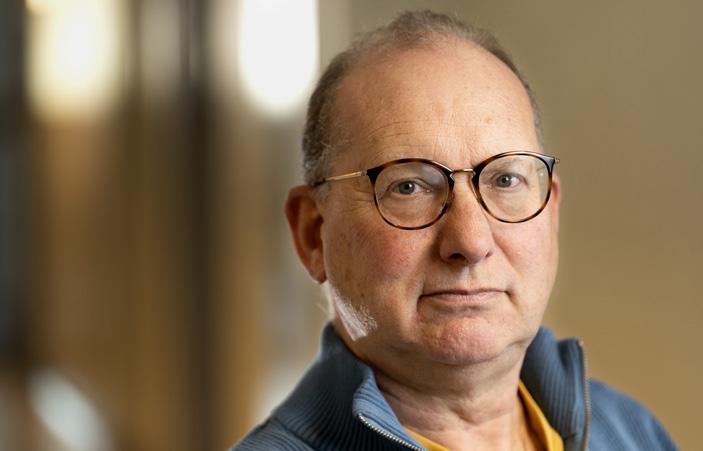
The EU is based on values such as respect for democracy, the rule of law and human rights. However, some member states have started to stray from these norms. Hungary is one example, where they have introduced constraints on freedom of the press and academic freedom as well as limited opportunities for opposition parties.
– At the moment , there is a struggle between conservative and liberal forces in several of the former Eastern Bloc countries. Many people there argue that they share a particular Central European culture that differs from both Western Europe and Russia and which needs safeguarding. But what culture is precisely is difficult to define, particularly as cultures are in a constant state of change.
The countries that oppose the values of the EU should be marginalised in various ways, argues Adrian Hyde-Price.
– But forcing member states to change is contrary to the principles of the European Union, which poses a dilemma. Perhaps the EU will gradually change, with a central core of integrated countries and one or two circles of states that share the common market but do not use the euro or are members of the Schengen Area.
Since March 7 Sweden is a member of NATO. This will increase security and stability in our part of the world, Adrian Hyde-Price argues.
– Putin’s rhetoric is centred on an expanded NATO being a threat to Russia. But the fact that Poland and the Baltic states, say, have a defence force that deters enemies from attacking them does not constitute a threat to any other country. Regardless of the outcome of the war, Russia is heading into a harsh future, where the lion’s share of the country’s budget is wasted on armament and where young soldiers are ground down in the meat grinder of war. The country has become isolated, poorer and forced to collaborate with dictatorships such as Chine, Iran and North Korea. The war is of course primarily a tragedy to Ukraine but also a disaster for Russia, particularly as the country was heading in a completely different direction 25 years ago.
GUJOURNAL MAY 2024 17
European history lives on
Increasing nationalism and a growing interest in European collaboration under the EU are two of the conflicting trends in Europa in the wake of war.
– Right-wing radical parties see success in many countries, but it is in countries in the former eastern bloc where they have been able to really set the agenda, explains Mats Andrén, Professor of the History of Ideas.
From having been one of the most democratic countries in the post-communist world, following Viktor Orbán’s ascension to power in 2010, Hungary has introduced a series of laws that has restricted the independence of the courts and limited the freedom of the press. Slovakia also has a right-wing nationalist government and in Poland, the conservative party Law and Justice had been in power for eight years before handing over to a liberal coalition last autumn, with Donald Tusk as prime minister.
– Of course, there are right-wing nationalist parties in countries that were not part of the eastern bloc as well, such as the Freedom Party of Austria and the Brothers of Italy. But these parties have not implemented such radical changes as have been done in Hungary and Poland, Mats Andrén explains.
One window to understanding Europe of today is to look back at history. For example, Hungarian nationalism is linked to the fact that the country before WWI was part of the Habsburg Empire, which included today’s Austria, Hungary, Czechia, Slovakia, Bosnia, Croatia, Slovenia as well as parts of Poland, Ukraine, Romania and Serbia.
– After WWI many European minorities received national independence, such as Czechoslovakia which was a democracy up until Nazi occupation in 1939. Among the losing countries we find Hungary, which lost around 70 percent of its historical territories through the Treaty of Trianon in 1920. The new borders did solve some of Europe’s minority issues but also led to new ones: such as Hungarians becoming a minority
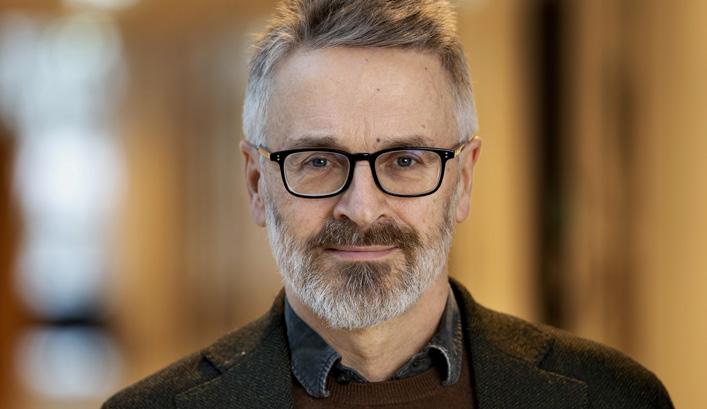
in Romania and Germans a minority in Czechoslovakia.
The autonomy of the small nations was challenged in the 1930s by both Germany, Italy and the Soviet Union, Mats Andrén points out.
– Today, it is Russia, in an attempt to roll back time, that is asserting its right to include independent nations in its sphere of influence. It matters less what the population in these areas think about it: in the referendum in Donbass in 1991 a large majority wanted to belong to Ukraine and the population of Crimea also voted in favour of Ukraine, even though the majority there was smaller.
In addition, Russia considers itself to have a special role in international history.
– Russian imperialism, which can be linked to enormous conquests by Catherine the Great at the end of the 1700s, is seen by its proponents as something different from Western expansionism. The Russian civilisation, which is partly based on the Orthodox Church, is considered to uphold values that have been lost in the individualistic, capitalist and decadent West
At an early stage, Poland had a parliamentary system but the country was divided up between Russia, Prussia and Austria-Hungary in 1790, and ceased to exist entirely as an independent nation in 1795 before its re-establishment in 1919. But a democratic government could not be established, neither during the inter-war period nor under Communism.
– This history affects the country both in terms of nationalism and its revolt against Russian power, as expressed through the Solidarność Union, which was formed in 1980. Today, Poland is divided into one part that is strongly western-oriented and one that is deeply conservative.
– This history affects the country both in terms of nationalism and its revolt against Russian power, as expressed through the Solidarność Union, which was formed in 1980. Today, Poland is divided into one part that is strongly western-oriented and one that is deeply conservative.
The European Union, which was formed in 1957, is one way of managing the many European peoples, languages and cultures: with open borders it is less problematic to speak German, work in Belgium and live in France, for example, Mats Andrén explains.
– While there is some EU sceptics among citizens, and the EU is very critical about the developments in Hungary and Poland, there is also a growing awareness of the importance of working together. This insight has been evident in various crises and is ever more pronounced now when joint action is required because of the war in Ukraine. Despite all the conflicts, the European Union has moved towards becoming a common and unifying forum for its member states, which now more than ever are able to speak with one voice.
18 GUJOURNAL MAY 2024
Report
Disrupted international order
Russia’s invasion of Ukraine risks disrupting the rules-based international order. This is what Joachim Åhman, Professor of International Law, argues.
– On the other hand, perhaps more countries have started to realise the importance of stronger safeguards for international law, and the values on which international law are based.
Russia’s war is not only an attack on Ukraine, but an attack on the very security arrangement that has been acknowledged since 1945. The foundation is the UN charter’s rules on international relations and the UN convention on human rights.
– Of course, there have always been states that ignored the rules. But when a large country such as Russia is in flagrant breach of international law without even trying to justify its actions it is both astounding and very serious, Joachim Åhman explains.
The UN charter stresses the sovereignty of all states.
– It is about acknowledging a rulesbased international order where might is right does not prevail. The fact that Russia has now chosen to ignore that order is of course very serious. But perhaps it may lead to other countries, even countries who have not opposed Russia’s actions, declaring with more emphasis that they respect the UN charter. A country that does not follow the rules cannot expect others to do so.
According to the UN charter, every country has the right to defend itself and the right to receive help to defend its territory, explains Joachim Åhman.
– That is what NATO is about, supporting one another in the event of an attack. But a country under attack does not need to be part of an alliance in order to get help. NATO could, for example, deploy its military in order to assist Ukraine in its defence. They are not doing so out of fear of escalating the war further.
Decisions by the Council of Ministers normally require a qualified majority. This means that no less than 55 percent of EU member states votes in favour of
the proposal, and that those countries comprise no less than 65 percent of the total population.
But if the European Union is to intervene in a conflict outside the union, all members must be in agreement. This was the reason why Hungary, up until February 1 this year, was able to block a special support fund to Ukraine, despite the other 26 member states having voted in favour of it.
– The European Union has other problems as well, such as countries that do not meet their obligations in terms of the principle of the rule of law, primarily Hungary and Poland. The question is how much control the European Union should exercise over its members. This summer, elections will be held to the European Parliament, where election turnout in most countries unfortunately is quite low. Naturally, it is a democratic problem if citizens do not think it is worth voting in elections.
Concern about Russia, but also about terrorism, has increased the requirements for protecting national security, says Joachim Åhman.
– Such measures often entails various
restrictions on the protection for rights and freedoms. For example, the principle of proportionality states that a measure must not be more extensive than is necessary to achieve its aim. But there also needs to be a balance between the interest that the measure is intended to protect and the interest in protecting human freedoms and rights. The more important the aim of the measure is, the more extensive the measures that will be permitted. National security is considered one of the most important areas of public interest, and the judicial system therefore normally permits very extensive measures in order to protect it. As ever more areas are associated with national security, there is a risk that we will be seeing greater restrictions to the protection of freedom and rights.
On February 2022, Ukraine applied for membership in the EU.
– Naturally, the war has to end first and the country begin to be rebuilt, explains Joachim Åhman. Then Ukraine must comply with the requirements set by the EU and this will take several years.
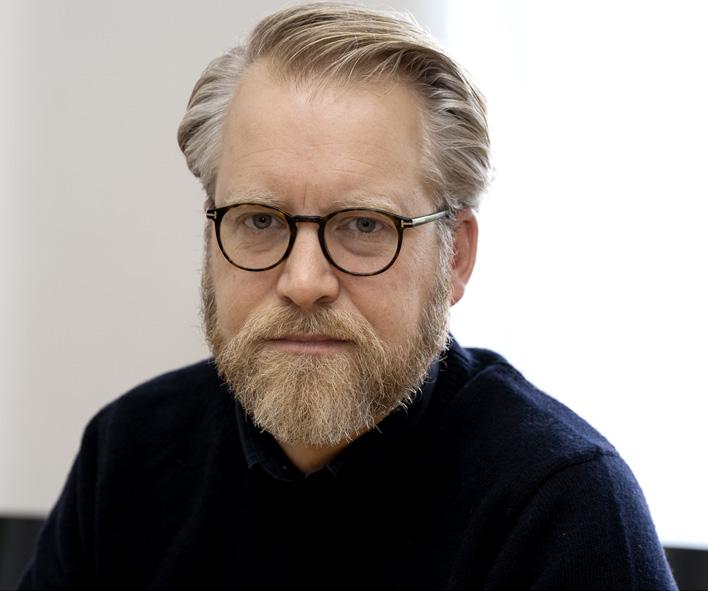
GUJOURNAL MAY 2024 19
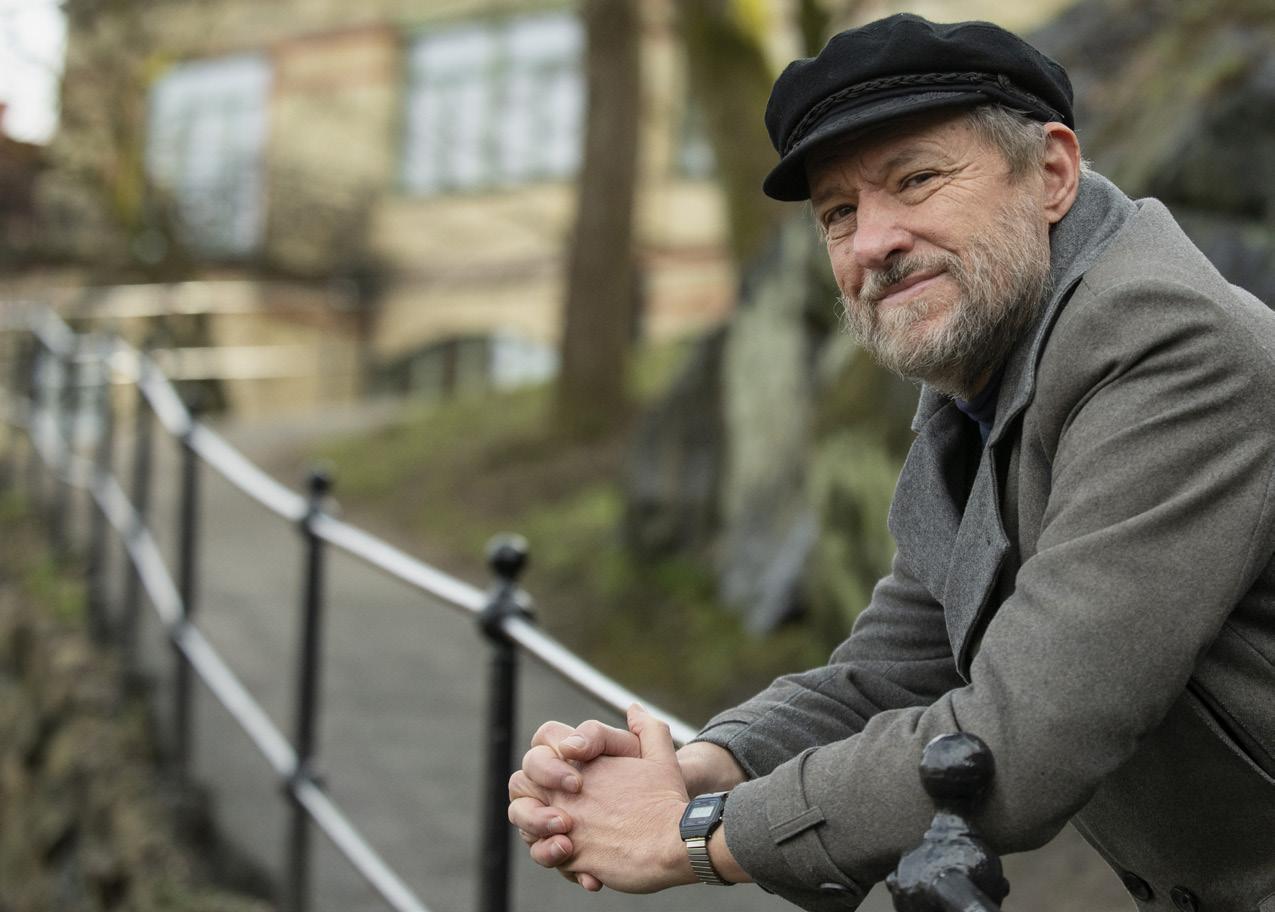
With encyclopedic knowledge
– In order to build a better society, we need to understand the world around us. My passion is to help create well-informed citizens.
This says Stephen Zunes, professor of politics, and Torgny Segerstedt, visiting professor at the Department of Sociology and Work Science.
Three moments were decisive for Stephen Zune when deciding which field of research to pursue. The first had him
questioning authorities at a very early age.
Stephen Zunes grew up in the American South, with parents who were among the few whites who openly protested against and broke the state government’s segregation laws.
– On my fifth birthday, I wanted to celebrate by going to the playground and the cinema. But many of my invited friends were not allowed to come; they couldn’t even drink from the same fountain just because of the color of their skin. At that very young age I realized that just because the government says something and that there
is a law, that doesn’t mean the government or the law is right.
At university he enjoyed the exchange of ideas and informal discussions. There were many international students and Stephen was keen to hear their perspectives. Although, becoming an academic was not something he planned on at this point.
This brings us to decisive moment number two, which took place when a 25-year-old Stephen began working in Philadelphia.
– I was something of an idealist and thought I could work full-time with political organizations engaged in peace, the
20 GUJOURNAL MAY 2024
Report

»I look at a lot of what is bad in the world, but a large part of my research is about documenting how social movements achieve change.«
STEPHEN ZUNES
environment, and other left-wing issues. However, I soon realized that organizing others was not one of my skills. I could achieve better things as a professor than an activist.
The past 28 years, Stephen Zunes has been a professor at the University of San Francisco. In addition to extensive academic work, he also writes non-academic articles available online and in journals, such as Tikkun, Truthout, and Foreign Policy in Focus.
– My work is not only for academics, bur for people in general. I want to serve
Since October, many people are interested in Stephen Zune’s political analyzes of US and UN views on Israel after the Hamas hostage-taking and Israel’s military actions in Gaza.
humanity and promote peace and social justice. I share that approach with Torgny Segerstedt and also with the Department of Sociology and Work Science’s approach to research.
The third defining moment occurred on September 11, 2001. After the terrorist attack on the World Trade Center, Professor Zunes was thrust into the spotlight because of his knowledge of US policy in the Middle East and North Africa.
– I became a public intellectual, one who appears in media and speaks at various forums. For example, I warned that the United States invading Iraq would lead to disaster. Unfortunately, I was right.
The media’s interest in his skills meant that he reached millions more than the limited number of students and graduates he previously had come in contact with.
One person who never got in touch was President George W. Bush.
– Politicians rarely ask for advice. They probably see me as someone leaning too much to the left. But I have been invited by Swedish parliament politicians in Stockholm to speak about Western Sahara.
He consider his task to be to provide both students and the public with knowledge and political analysis.
– I don’t see myself as an activist, but I trust that students and others can translate the knowledge I give them into politics, says Stephen Zunes, who has been told that he has an encyclopedic knowledge of modern history and global teaching.
Many of Stephen Zune’s students have chosen careers where they work for non-governmental organizations, social justice groups, aid organizations or do research in these fields.
– Maybe I’m not so good as a political organizer, but I seem to have inspired others in that direction, and am proud of my students, says Stephen Zunes.
The United States is often described as one of the world’s first and largest democracies. The US helped create both
the UN and international legislation and often talks about freedom, democracy, and human rights. At the same time, the US also support totalitarian and authoritarian states.
– I want to highlight the hypocrisy and the double standard, the contradictions between what is said and how it actually looks, says Stephen Zunes, who examines the United States’ involvement in various international conflicts in relation to international legislation.
His other major area of research deals with people’s ability to challenge and overthrow oppressive regimes.
– I look at a lot of what is bad in the world, but a large part of my research is about documenting how social movements achieve change. When people realize that they, by coming together, can alter social injustices, they often bring about more long-term and real change. More people need to realize this. It is also important to suggest alternatives, not just point out what is wrong.
Since arriving at the University of Gothenburg in January, Stephen Zunes has not had time to do as much research as he expected.
– I have been asked to hold a lot of lectures, seminars, and interviews. And I am happy to be of service to the academy and people in general.
Fakta: Torgny Segerstedt’s guest professorship is financed by Torgny Segerstedt Memorial Foundation.
Stephen Zunes, professor of politics at the University of San Francisco, is Segerstedt-professor this spring.
GUJOURNAL MAY 2024 21 News
Text och Photo: Anna Rehnberg






 Vice-Chancellor MALIN BROBERG
Vice-Chancellor MALIN BROBERG
















